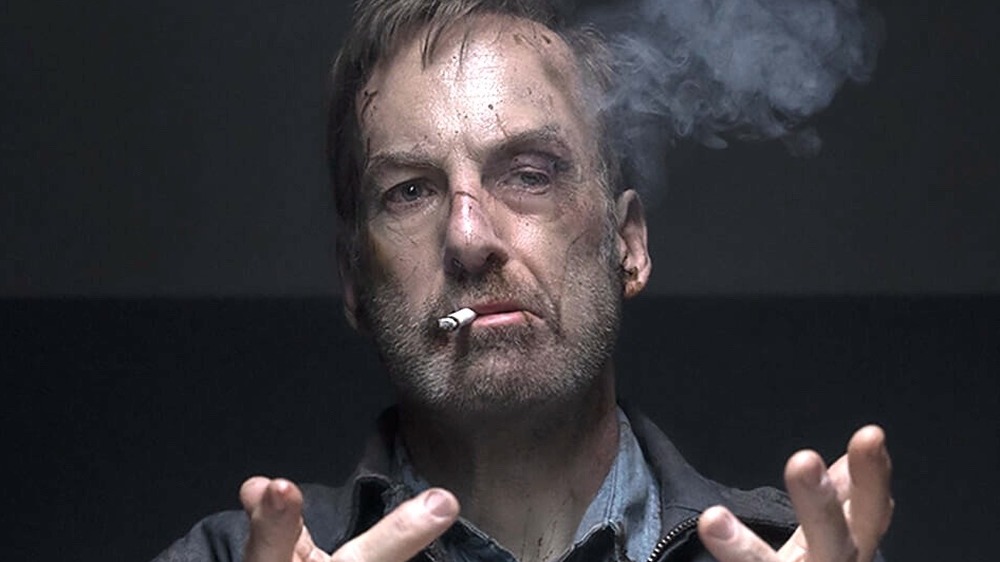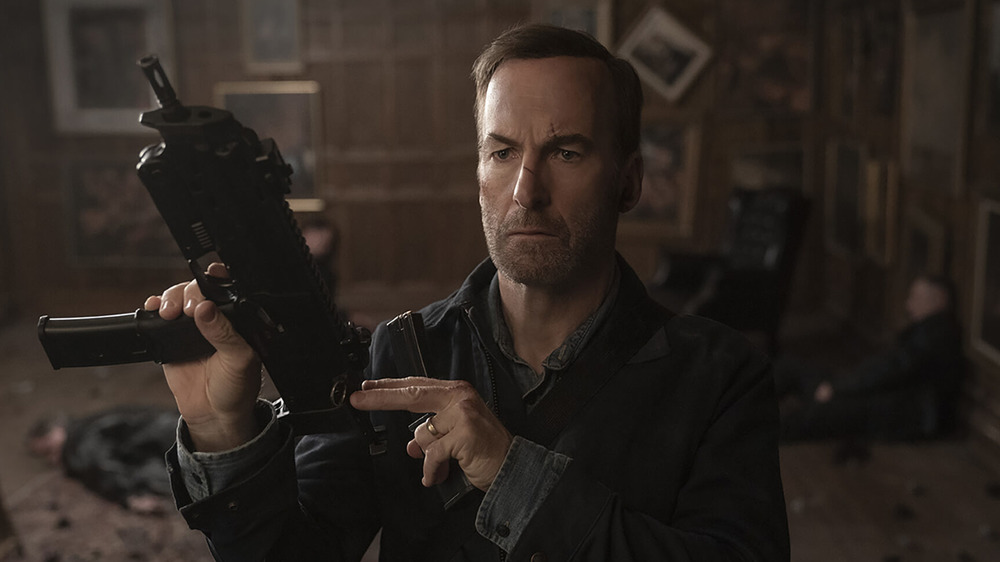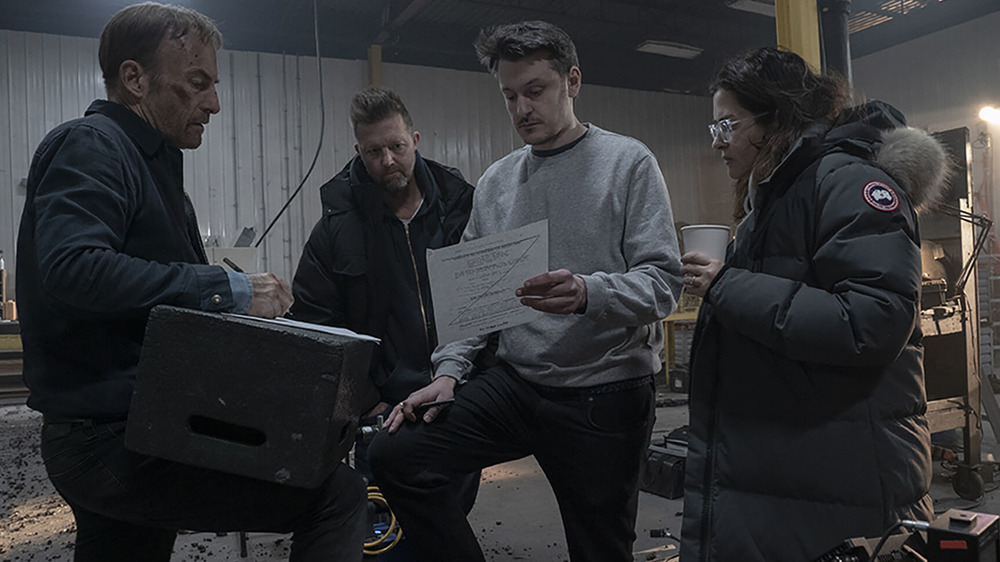Nobody Review: Breaking Dad
An action flick built on a foundation of confused identity, mysterious intent, and a heaping helping of kicked butts, the key to Nobody may reside in a quick, throwaway moment. As Bob Odenkirk's character prepares to take on several dozen armed-to-the-teeth Russian mobsters, he glances over at a sign reading: "This department has worked 204 days without a lost time accident." He wipes away the total, squints his eyes and heads off into battle.
Ha... ha?
It's a moment of levity you couldn't imagine getting from Liam Neeson or Keanu Reeves. It's one of the only moments that feels like it couldn't be in an Equalizer movie. So is the scene cluing us in that Nobody is a spoof? That the "highly trained victim" genre has finally reached the point where its conventions are being mocked? That 30 years ago, Nobody would've been directed by Jim Abrahams and have an exclamation point at the end of its title?
It's really hard to tell. So much of this movie is deadly, brutally, bloodily serious that, much like understanding Odenkirk's character in the film, every time you think you've got your bearings, you find out that you don't. But you know what? In the end, this inability to be nailed down is what makes Nobody so fun to watch.
At the beginning of the film we meet Hutch Mansell (Odenkirk), and every indication is that he's a nondescript suburban dad going to work, chasing the garbage truck, and making the occasional lasagna for his family. After his house is robbed and he lets the thieves walk away unchallenged, everyone in Hutch's life writes it off to his non-confrontational demeanor, with son Blake (Gage Munroe) seeming particularly disappointed.
But like every other middle-aged action star vehicle of the past decade or so, Nobody alludes to Hutch possessing a very particular set of skills. He might be ex-military. He might have a hidden arsenal in his house, prepared to wage war at any moment. He might be the type of guy who can walk into a warehouse filled with black-clad baddies and take them all down, simply because they did him wrong.
Since we're not looking at Denzel or Costner or Frank Grillo here, and instead at Bob Odenkirk, you can be forgiven if you think it's all a gag. Early in the film, when a bad guy spots Hutch's tattoo (divulging his elite killer past) and runs away scared, you might think the soon-to-be-revealed joke is that Hutch got the tattoo accidentally and this is a case of mistaken identity. Even when Hutch starts fighting, and his methods seemingly consist of getting stabbed, slammed and thrown through windows, you might think the joke is that he thinks he's a fighter, but he's not a very good one.
This is no joke
What gnaws at the viewer is that throwaway moment. The scene when Hutch wipes away the "This department has worked 204 days without a lost time accident" sign before slicing through professional assassins like a knife through butter. That seems like something Leslie Nielsen would have done; that seems like something you would have seen in a Hot Shots! or Scary Movie. That seems like the sort of thing that should be happening in 2021 to the highly trained victim genre, which feels like it played itself out two Takens ago.
But the punchline never comes and the joke, it seems, is on us. Odenkirk's character really was once a badass, and the movie kicks into high gear after he sends his family into hiding, reconnects with his old ways, and launches an all-out assault against a bunch of bloodthirsty Russians who never seem to run out of bullets or ill-fated henchmen.
So if Nobody is to be taken seriously, it should be judged against its peers, right? The film most closely resembles the John Wick series, and most certainly realizes it. There's a pet (in this case, a cat rather than a dog), a muscle car (this time, a '72 Challenger rather than a '69 Ford Mustang), powerful Russians with misbehaving family members, long-hidden stashes of weapons and gold ready to be put to use, and slowly unveiled details about the protagonist's retirement from a life that makes a Navy SEAL look like a Girl Scout.
Is the fight choreography as good as the John Wick films? Not even close. Does the world of Nobody approach the Wick universe populated by such imaginative elements as the Continental Hotel, the New York hobos (led by the Bowery King), the High Table of crime lords, or Ruby Rose's mute assassin in the second film? A few elements showing deeper complexities are alluded to, but seem more like bait for a possible sequel. Most importantly, does Odenkirk convincingly transform into a guy who could convincingly beat you bloody? Not really.
Which isn't to say that Bob Odenkirk isn't a fascinating screen presence. From the early days of Mr. Show to Better Call Saul, he has perfected a combination of quirk and grit, world-weariness and mischief, enigma, and everyman that is truly one of a kind. But if Nobody is not a parody, if he's tumbling across the floor dodging bullets and bashing in skulls with a tea kettle and such scenes aren't intended to be the 2021 equivalent of Robert Stack beating up people in an airport, shouldn't he at least have bulked up a little? It's one thing to be told that 20 years ago, Hutch developed the skills to take on five guys in a bus and put them all in the hospital; it's another to say that he's physically fine-tuned enough to do so now, especially when he takes off his shirt and looks like... well... us.
So the film becomes a tug of war between how much you love Bob Odenkirk, and whether that's enough to disregard the movie's inferiority to Wick and Taken and the Equalizer films and all the rest. In the end, it feels like somebody went back in time to the '80s heyday of Schwarzenegger and Stallone and gave one of their lesser scripts to Steve Martin.
Choreographing the kills
Perhaps Nobody is opening the door to a new genre unto itself: the spoof film as a wolf in sheep's clothing. Or perhaps it is the highly trained victim equivalent of Scream, a spoof movie with a body count and bloodshed that simultaneously makes fun of a genre while making you feel like you're watching one of its films. But in the Scream series, the characters always seemed like they were aware of the films inspiring their dilemma; here, there are no wink-wink jokes about Keanu Reeves.
Well, this much is certain: Christopher Lloyd is a blast as Hutch's not-so-helpless elderly dad. RZA brings tremendous personality to a handful of scenes as Hutch's backup. Russian actor Aleksey Serebryakov is an absolute force of nature as the Russian top mobster who has an unapologetic affinity for singing karaoke, snorting drugs, and smashing skulls.
Much of the movie seems to have been built with GIFs in mind, such as a profanity-laden line about a kitty-cat bracelet that feels like something Samuel L. Jackson could have screamed in Snakes on a Plane. How proficiently this film enters the zeitgeist remains to be seen, but it's interesting how the highly trained victim films have increasingly come to resemble slasher flicks.
Instead of rooting for the homicidal bad guy, we now root for the homicidal good guy. Fans might not remember which film had Jason Voorhees shooting a harpoon through some dude's eye, but they love reminiscing about the kill. Similarly, we remember when John Wick killed the guy with a pencil; in Nobody, Odenkirk has memorable kills utilizing the pull cord on a bus, a ballpoint pen, and a series of mousetraps. The villain has a penchant for martini glasses; RZA has a thing for staplers.
On the downside, Nobody leaves more loose ends than an interrupted knitting circle. Hutch's fractured relationship with his son seems to be an exploration of emasculation in the eyes of one's offspring, but since the son vanishes from the film, we're robbed of any moment when the kid reacts to the revelation that dad's a tough guy. Hutch's wife (Connie Nielsen) seems to have been aware of Hutch's background, and eventually comes to approve of its re-emergence, but we're never privy to that journey. Hutch is intent on buying a factory warehouse from his in-laws, seems to appreciate all the sweat and toil they've put into it, then purchases it — only to use it as the backdrop for a MacGyver-like showdown that leaves the premises drenched in carnage and pretty much destroyed.
Nobody is boosted by an impressive visual style and infectious energy from Hardcore Henry director Ilya Naishuller, and punctuated by a soundtrack of ironic oldies that literally begs "Please Don't Let Me Be Misunderstood." What are its true intentions? Is it teasing its genre or embracing it? Is Odenkirk supposed to be a believable butt-kicker? Only Nobody knows.


